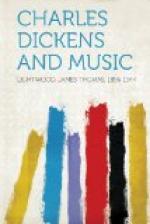FLY, FLY FROM THE WORLD, MY BESSY, WITH ME (S.B.S. 2)
Words and music by T. Moore.
FOR ENGLAND
See ‘Death of Nelson.’
FOR ENGLAND, HOME, AND BEAUTY
See ‘Death of Nelson.’
FOR THE PORT OF BARBADOS, BOYS (D. & S. 15)
Original (?) See p. 122.
FROM SPORT TO SPORT (O.C.S. 58)
From ‘Oh no, we never mention her.’
Words by T.H. Bayly. H.R. Bishop.
From sport to sport they hurry
me,
To banish my regret;
And when they win a smile
from me,
They think that
I forget.
GEE UP, DOBBIN (D.C. 12)
In the Burney Collection is a tune ‘Gee Ho, Dobbin.’ Also in Apollo’s Cabinet, 1757, Vol. II, and Love in a Village, 1762. The tune was frequently used for ephemeral songs.
It is doubtful if Dickens would know this song, the title of which has passed into a common phrase.
GLORIOUS APOLLO (O.C.S. 13, 56)
S.
Webbe.
The title of this glee probably suggested the name
of the
‘Glorious Apollers.’ See p. 124.
GO WHERE GLORY WAITS THEE (M.C. 11)
(’Do they often go where glory waits ’em?’ O.C.S. 58)
Moore’s Irish Melodies, set to the air ‘Maid of the Valley.’
GOD BLESS THE PRINCE OF WALES (U.T. 29)
Words by J. Ceiriog Hughes.
Trans, by G. Linley. H. Brinley
Richards, 1862.
GOD BLESS YOU, MERRY GENTLEMEN (C.C.)
Origin unknown. The second word should be ‘rest,’ and the correct reading is
God rest you merry, gentlemen.
GOD SAVE THE KING (S.B.S. 19, &c.)
GOD SAVE THE QUEEN (M.C. 29)
It is unnecessary here to discuss the origin and sources of this air. The form in which we know it is probably due to Henry Carey, and the first recorded public performance was on September 28, 1745.
HAD I A HEART FOR FALSEHOOD FRAMED (D. & S. 14)
Words by R.B. Sheridan.
Sung by Mr. Leoni (see Choir, May, 1912).
In the Duenna, 1775. Set to the air now known as ’The Harp that once through Tara’s Halls.’




